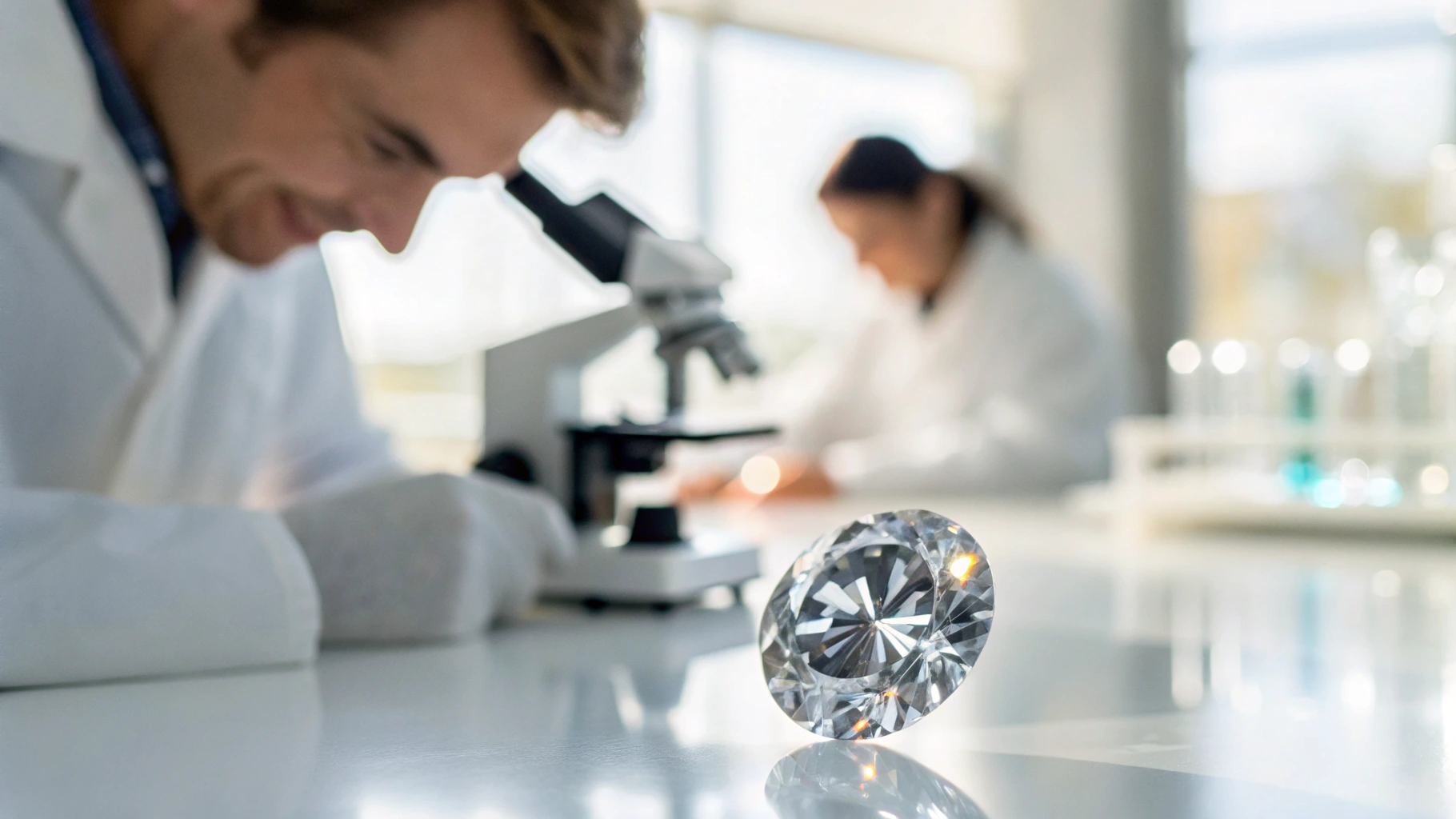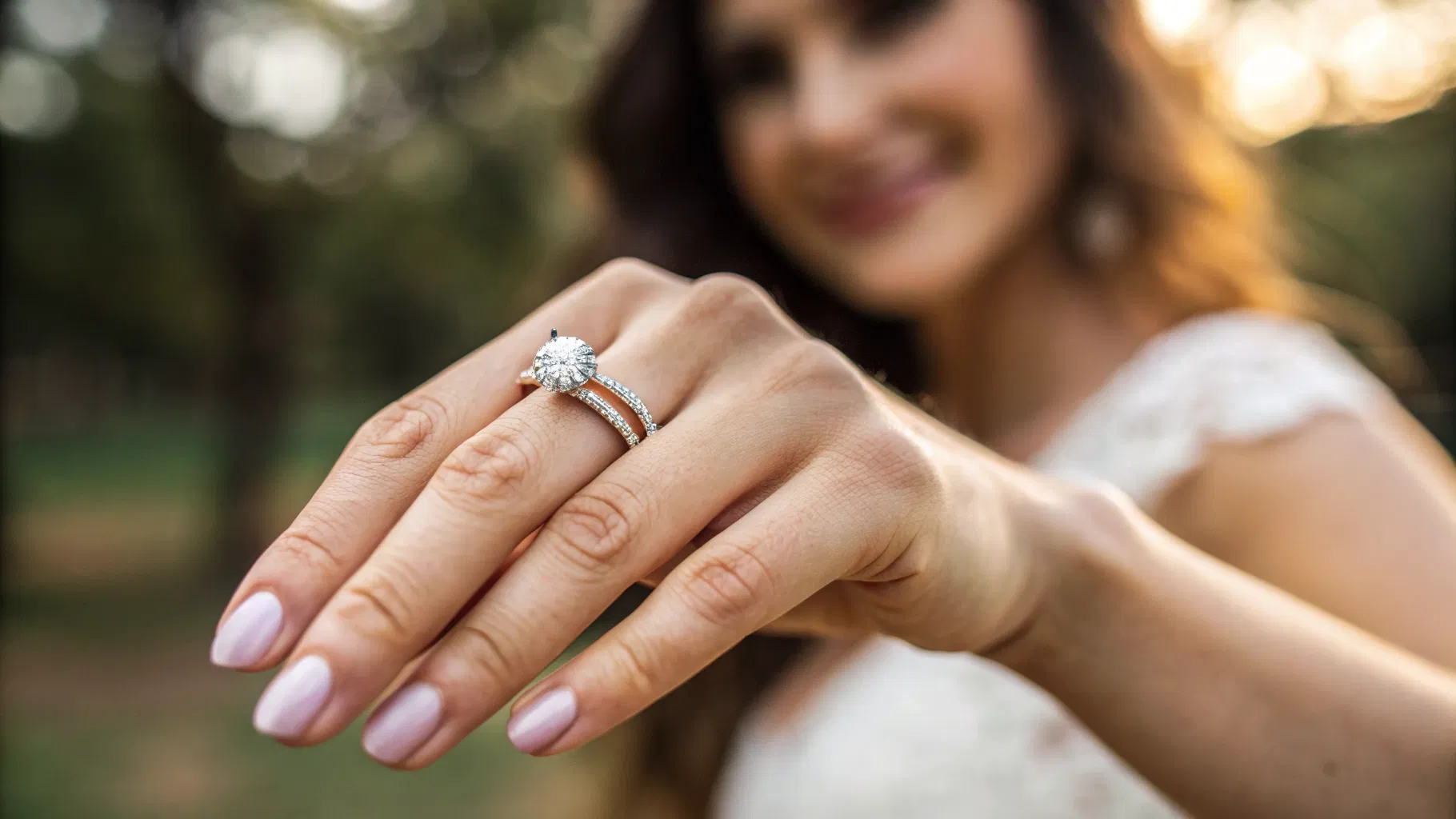
How to Test for Lab-Grown Diamonds: Understanding the Science Behind Your Sparkle
Introduction
Can true luxury also be truly ethical? With the rise of lab-grown diamonds, this question resonates more than ever among consumers who are increasingly conscious about the impact their purchases have on the world. As we navigate the landscape of fine jewellery, the demand for sustainable, conflict-free options has surged, allowing us to enjoy exquisite pieces without compromising our values. Are you dreaming of a piece of jewellery that’s as unique as your story? At DiamondsByUK, we are committed to making sustainable luxury accessible to all, offering beautifully crafted lab-grown diamond jewellery that is perfect for any occasion.
In this blog post, we'll explore how to test for lab-grown diamonds, ensuring you can confidently select the perfect piece for yourself or a loved one. We will delve into the science behind these stunning gems, discuss the various testing methods available, and provide insights into the benefits of choosing lab-grown diamonds. Our goal is to empower you with knowledge, allowing you to make informed and joyful jewellery choices.
Let’s embark on this journey to uncover the truth about lab-grown diamonds, their testing methodologies, and how DiamondsByUK is leading the charge in redefining luxury with our commitment to sustainability, integrity, and craftsmanship.
Understanding Lab-Grown Diamonds
Before we dive into testing methods, let’s clarify what lab-grown diamonds are and how they differ from their mined counterparts. Lab-grown diamonds are created in controlled environments using advanced technological processes that replicate the natural conditions under which diamonds form in the Earth. The two primary methods of creating lab diamonds are High-Pressure High-Temperature (HPHT) and Chemical Vapor Deposition (CVD).
The Science Behind Lab-Grown Diamonds
- High-Pressure High-Temperature (HPHT): This method mimics the natural diamond formation process by applying extreme pressure and temperature to carbon. HPHT diamonds typically exhibit the same physical and chemical properties as natural diamonds.
- Chemical Vapor Deposition (CVD): In this process, a diamond seed is placed in a chamber filled with carbon-rich gas. The gas is heated, causing carbon atoms to cling to the seed, gradually forming a diamond over time. CVD diamonds often boast higher clarity and color grades than some natural diamonds.
Both methods produce diamonds that are chemically identical to mined diamonds, making them a beautiful, ethical, and often more affordable alternative. At DiamondsByUK, we proudly offer IGI-certified lab-grown diamonds, ensuring that our customers receive only the highest quality pieces.
How Lab-Grown Diamonds Are Tested
Now that we understand what lab-grown diamonds are, let’s delve into how to test for lab-grown diamonds. There are various methods employed to differentiate between lab-grown and natural diamonds, each with its own advantages and limitations.
1. Diamond Testers
Diamond testers, often known as diamond selectors, are handheld devices that primarily assess the thermal and electrical conductivity of a diamond. Here’s how they work:
- Thermal Conductivity Test: Diamonds are excellent thermal conductors, allowing heat to dissipate quickly. When a diamond tester is applied to a stone, it measures how well the stone conducts heat. Lab-grown diamonds will typically show results similar to natural diamonds in this test.
- Electrical Conductivity Test: This test evaluates the stone's ability to conduct electricity. While natural diamonds are poor electrical conductors, lab-grown diamonds may exhibit varying levels of conductivity based on their specific growth processes.
2. Advanced Testing Techniques
While standard diamond testers can effectively identify genuine diamonds, they may not differentiate between lab-grown and natural ones. For this purpose, more advanced testing techniques are employed:
- DiamondView: Developed by the Gemological Institute of America (GIA), this tool uses UV light to reveal growth patterns in diamonds. Natural diamonds display straight growth patterns, while lab-grown diamonds often exhibit curved patterns, which can help in identification.
- Spectroscopy: Advanced spectroscopic techniques analyze the light emitted or absorbed by a diamond to reveal its unique spectral fingerprint. This method can distinguish between natural and lab-grown diamonds based on their specific characteristics.
- X-Ray Luminescence (XRL): This technique examines how diamonds respond to X-rays. Lab-grown diamonds may exhibit specific luminescence patterns that differ from those of natural diamonds.
- Raman Spectroscopy: This powerful analytical technique investigates the vibrational modes of diamond crystals. By shining a laser on the diamond and analyzing the scattered light, gemologists can identify the diamond's origin based on its unique Raman spectrum.
3. Visual Inspection
In addition to the above methods, a trained jeweller can often identify subtle inclusions that may differ between lab-grown and natural diamonds. While this method is not foolproof, it can provide additional insights when assessing a diamond.
The Importance of Certification
When purchasing lab-grown diamonds, it’s essential to acquire stones that come with proper certification. At DiamondsByUK, we offer IGI-certified diamonds, ensuring that every piece you purchase is ethically sourced and meets rigorous quality standards. This not only gives you peace of mind but also enhances the value of your investment.
Why Choose Lab-Grown Diamonds?
Choosing lab-grown diamonds comes with numerous benefits, making them an increasingly popular choice among consumers. Here are just a few reasons to consider lab-grown diamonds for your next jewellery piece:
1. Ethical Considerations
Lab-grown diamonds are 100% conflict-free, meaning they are not associated with any unethical mining practices or human rights abuses. By choosing lab-grown diamonds, you are supporting a more responsible and sustainable jewellery industry.
2. Environmental Impact
The environmental footprint of lab-grown diamonds is significantly smaller than that of mined diamonds. The process of growing diamonds in a lab is far less destructive to the environment, preserving ecosystems and reducing carbon emissions.
3. Cost-Effectiveness
Lab-grown diamonds are generally more affordable than natural diamonds, allowing you to get more sparkle for your budget. This cost-effectiveness means you can invest in larger, higher-quality stones without breaking the bank.
4. Customization Options
At DiamondsByUK, we specialize in bespoke jewellery design, allowing you to create a piece that reflects your unique style and story. Our lab-grown diamonds can be fully customized, often with a quick turnaround of just 1-2 weeks. Whether you're looking for an engagement ring, a necklace, or any other piece of jewellery, we are here to help you every step of the way.
5. Quality Assurance
Lab-grown diamonds often exhibit superior clarity and color grades compared to many natural diamonds, thanks to the controlled environment in which they are created. This ensures that you receive a stunning gem that sparkles brilliantly.
The DiamondsByUK Commitment
At DiamondsByUK, we are dedicated to redefining luxury through our mission of making sustainable, conflict-free diamond jewellery accessible to all. Our core values of sustainability, integrity, craftsmanship, and customer focus guide us in every aspect of our business. We believe that ethical luxury should be beautifully crafted and tailored to individual tastes.
Our commitment to exceptional customer service means that we are here to assist you from design to doorstep. Whether you're looking for a unique engagement ring or a meaningful gift, we invite you to explore our collection of lab-grown diamonds and experience the beauty of ethical jewellery.
Join us in leading the shift towards more responsible, customer-centered practices in the jewellery industry. Design Your Bespoke Jewellery with DiamondsByUK today!
Conclusion
As we continue to embrace the beauty of lab-grown diamonds, understanding how to test for them becomes essential for making informed choices. The methods available, from diamond testers to advanced spectroscopic techniques, ensure that you can confidently select genuine lab-grown diamonds that meet your ethical standards.
At DiamondsByUK, we are proud to offer a range of IGI-certified lab-grown diamonds that are not only stunning but also environmentally conscious and ethically sourced. Our bespoke design services allow you to create unique pieces that celebrate your individuality while aligning with your values.
We encourage you to take the step towards sustainable luxury by exploring our collection and starting your custom design journey with us. Together, let’s redefine what it means to wear luxury—ethically, beautifully, and sustainably.
FAQ
1. Do lab-grown diamonds pass diamond testers? Yes, lab-grown diamonds typically pass diamond testers, showing results similar to natural diamonds in thermal and electrical conductivity tests.
2. How can I tell if my diamond is lab-grown or natural? To accurately determine if a diamond is lab-grown or natural, advanced testing techniques such as UV light testing, spectroscopy, and professional gemological analysis may be necessary.
3. What should I look for when purchasing a lab-grown diamond? Ensure the diamond is IGI-certified, check for the clarity and color grades, and inquire about the customization options available.
4. How long does it take to design a custom piece with DiamondsByUK? Our bespoke jewellery design process typically has a turnaround of just 1-2 weeks, allowing you to receive your unique piece in a timely manner.
5. Are lab-grown diamonds a good investment? While lab-grown diamonds are generally more affordable, they do not hold the same rarity as natural diamonds. However, they offer exceptional beauty and ethical value, making them a meaningful choice for many consumers.
Explore our offerings and contact us to create your unique piece—almost any design is fully customizable with DiamondsByUK! Contact Us to Create Your Unique Piece.


